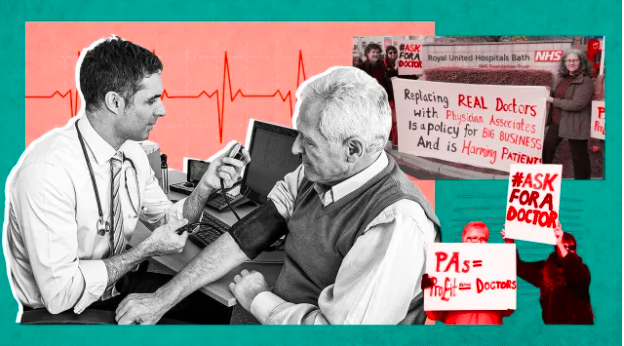Trending Stories
Understanding the Roles: GP vs. Physician Associate

Understanding the Roles: GP vs. Physician Associate
General Practitioners (GPs) are fully qualified doctors who have completed extensive training in general medicine. They are responsible for diagnosing and treating a wide range of medical conditions. GPs can prescribe medications, refer patients to specialists, and provide ongoing care for chronic conditions.
Physician Associates (PAs)
Physician Associates (PAs) are healthcare professionals who support doctors in diagnosing and managing patients. They undergo a shorter training period compared to GPs and work under the supervision of a doctor. PAs can perform examinations, make diagnoses, and develop management plans, but their scope of practice is more limited.
The Incident: Misdiagnosis by a Physician Associate
Initial Symptoms and Consultation
Jane Doe, a 45-year-old woman, visited her local clinic with persistent abdominal pain. Expecting to see her regular GP, she was instead attended to by a PA. The PA conducted a brief examination and diagnosed her with irritable bowel syndrome (IBS), prescribing medication accordingly.
Ongoing Issues and Further Consultations
Despite following the prescribed treatment, Jane’s symptoms did not improve. She returned to the clinic multiple times, each time being reassured by the PA that her condition was under control. However, her condition continued to deteriorate, prompting her to seek a second opinion from a GP at another clinic.
Correct Diagnosis and Treatment
Upon consulting the GP, Jane underwent a thorough examination and was referred for further tests. The results revealed that she had a more serious condition, ovarian cancer, which had been overlooked by the PA. Immediate treatment was initiated, significantly improving her prognosis.
The Implications of Misdiagnosis
Delayed Treatment
Delayed Treatment can have serious consequences, especially for conditions like cancer, where early detection is crucial. Misdiagnosis can lead to delayed treatment, worsening of the condition, and reduced chances of recovery.
Emotional and Psychological Impact
The emotional and psychological impact of a misdiagnosis can be profound. Patients may experience anxiety, stress, and a lack of trust in the healthcare system. This can affect their overall well-being and willingness to seek medical help in the future.
Financial Burden
A misdiagnosis can also result in a significant financial burden due to unnecessary treatments, additional consultations, and prolonged illness. Patients may incur high medical costs and face potential loss of income due to extended sick leave.
Ensuring Accurate Diagnosis and Quality Care
Advocating for Yourself
Patients should feel empowered to advocate for themselves during medical consultations. If you feel your symptoms are not being taken seriously, don’t hesitate to ask for a second opinion or request to see a GP instead of a PA.
Understanding Your Healthcare Team
It’s important to understand the roles of the various members of your healthcare team. Knowing the difference between a GP and a PA can help you make informed decisions about your care.
Communication is Key
Effective communication with your healthcare provider is essential. Clearly describe your symptoms, ask questions, and ensure you understand the diagnosis and treatment plan.
Follow-Up Appointments
Don’t overlook the importance of follow-up appointments. These visits allow for the monitoring of your condition and adjustments to your treatment plan as needed.
Seeking a Second Opinion
If you’re uncertain about a diagnosis or treatment plan, consider seeking a second opinion. Another healthcare professional might provide a different perspective that could be crucial for your health.
Conclusion
Misdiagnosis by a physician associate, as experienced by Jane Doe, underscores the importance of understanding the roles of healthcare providers and advocating for oneself. While PAs play a valuable role in the healthcare system, patients should ensure they receive the appropriate level of care, especially for serious conditions. Clear communication, follow-up appointments, and seeking second opinions can significantly improve the quality of care and outcomes for patients.
FAQs
1. What is the difference between a GP and a physician associate?
A GP is a fully qualified doctor with extensive training in general medicine, capable of diagnosing and treating a wide range of conditions. A PA is a healthcare professional who supports doctors, with a more limited scope of practice and supervision from a doctor.
2. Can a physician associate prescribe medication?
Yes, physician associates can prescribe medication, but their prescribing rights may vary depending on the country and the specific regulations in place. They work under the supervision of a doctor.
3. How can I ensure I see a GP instead of a PA?
When booking an appointment, you can request to see a GP specifically. If a PA attends to you, you have the right to ask for a consultation with a GP, especially if you feel your condition requires more specialized attention.
4. What should I do if I feel misdiagnosed by a PA?
If you feel misdiagnosed, seek a second opinion from a GP or another healthcare professional. Communicate your symptoms and concerns, and ask for further tests if necessary.
5. Are physician associates as qualified as GPs?
Physician associates are qualified healthcare professionals, but their training is shorter and their scope of practice is more limited compared to GPs. They are valuable members of the healthcare team but should not replace the specialized care provided by GPs.
References:
Trending Stories
Can Supplements Fix Belly Fat? Experts Weigh in on the “Cortisol Pouch” Myth
Trending Stories
Sister Regina Liu: Empowering Health Through Acupuncture

Sister Regina Liu: Empowering Health Through Acupuncture
In the bustling world of healthcare, Sister Regina Liu stands out as a beacon of holistic healing. Her journey into the world of acupuncture is not only inspiring but also transformative for the countless individuals she has treated.
Through her dedication, Sister Regina has brought traditional Chinese medicine to the forefront, offering an alternative and complementary approach to modern medical practices.
The Journey of Sister Regina Liu
Sister Regina Liu’s path to becoming a renowned acupuncturist began with her deep-rooted interest in holistic health. Born into a family that valued traditional Chinese medicine, Sister Regina was exposed to the benefits of acupuncture from a young age. Her early fascination turned into a lifelong passion as she pursued formal education and training in the field.
Acupuncture: Bridging Ancient Wisdom and Modern Health
Acupuncture, a practice with origins in ancient China, involves inserting thin needles into specific points on the body to balance the flow of energy or “qi.” Sister Regina Liu has mastered this ancient art, using it to address a wide range of health issues.
From chronic pain to stress management, her expertise has provided relief to many who had exhausted conventional treatment options.
Impact on Community Health
Sister Regina’s impact extends beyond individual treatments. She has been instrumental in educating the community about the benefits of acupuncture, breaking down misconceptions, and making the practice more accessible.
Her workshops and seminars have enlightened many about the holistic approach to health, emphasizing the interconnectedness of body, mind, and spirit.
Success Stories and Testimonials
The success stories of Sister Regina’s patients are a testament to her skill and dedication. Many individuals who had lost hope found solace in her treatments.
For instance, Maria, a long-time sufferer of migraines, experienced significant relief after just a few sessions with Sister Regina. Her story is just one of many that highlight the transformative power of acupuncture under Sister Regina’s care.
Challenges and Triumphs
Like any journey, Sister Regina’s path was not without challenges. Integrating acupuncture into mainstream healthcare faced resistance initially.
However, her perseverance and the undeniable results of her treatments gradually won over skeptics. Today, Sister Regina is not only respected in the field of acupuncture but also in the broader medical community.
The Science Behind Acupuncture
While acupuncture is rooted in ancient practices, modern science has begun to unravel the mechanisms behind its effectiveness. Studies have shown that acupuncture can stimulate the release of endorphins, the body’s natural painkillers, and improve blood circulation.
These scientific validations have further cemented acupuncture’s place in contemporary healthcare, thanks in part to advocates like Sister Regina Liu.
Acupuncture in Modern Healthcare
Sister Regina’s work exemplifies how traditional practices can complement modern medicine. Hospitals and clinics increasingly incorporate acupuncture into their treatment plans, recognizing its benefits in pain management, mental health, and overall well-being. This integration signifies a broader acceptance and understanding of holistic health practices.
Future Vision
Looking ahead, Sister Regina Liu envisions a future where acupuncture and traditional Chinese medicine are fully integrated into the global healthcare system. She continues to advocate for research, education, and policy changes that support the inclusion of holistic practices in mainstream medicine.
How to Get Started with Acupuncture
For those new to acupuncture, Sister Regina offers practical advice on getting started. She recommends finding a certified acupuncturist, understanding the treatment process, and maintaining an open mind. Her guidance helps demystify acupuncture, making it more approachable for newcomers.
Conclusion
Sister Regina Liu’s journey in empowering health through acupuncture is a remarkable tale of dedication, resilience, and success. Her contributions have not only alleviated individual suffering but also enriched the broader understanding of holistic health. As acupuncture continues to gain recognition, Sister Regina’s legacy will undoubtedly inspire future generations of healers.
FAQs
1. What conditions can acupuncture treat?
Acupuncture can address various conditions, including chronic pain, migraines, stress, anxiety, digestive issues, and more. It is also used to support overall wellness and balance.
2. Is acupuncture safe?
Yes, when performed by a certified and experienced acupuncturist, acupuncture is safe. It involves using sterile, single-use needles and adhering to proper hygiene practices.
3. How many sessions are needed to see results?
The number of sessions varies depending on the condition and individual response. Some may experience relief after one session, while others may need multiple treatments.
4. Does acupuncture hurt?
Acupuncture needles are very thin, and most people feel minimal to no discomfort. Some may feel a slight tingling or warmth at the needle site.
5. How do I find a qualified acupuncturist?
Look for acupuncturists who are certified by recognized professional organizations and have positive patient reviews. Personal recommendations and consultations can also help in making an informed choice.
References
Trending Stories
In 2 Shape Gym Unveils Major Expansion in Stourport
-

 Trending Stories1 year ago
Trending Stories1 year agoCDC: 1 in 4 Americans Still COVID-Free by End of 2022
-

 Health8 months ago
Health8 months agoHow Do Pawpaw Seeds Support Cardiovascular Health?
-

 Health5 years ago
Health5 years agoMeghan Trainor Shares Motivational New Song ‘Blink’
-

 Health2 years ago
Health2 years agoHow Long Does Monkey Pox Last Before It Surfaces in the Body?
-

 Health3 years ago
Health3 years agoWhat Causes Swollen Body? Understanding Edema and its Triggers
-

 Health3 years ago
Health3 years agoNutrition and the Importance of a Fitness Program – 3 Things to Know
-

 Health3 years ago
Health3 years ago5 Weird Reasons Why Pimples Disappear After Marriage
-

 Health3 years ago
Health3 years agoHealth Benefits Of Pawpaw Seed? 7 Things To Know







